 |
|||||
|
|||||
| Preview of Stamps Catalogue: VOLUME 1 |
 |
|||||
|
|||||
| Preview of Stamps Catalogue: VOLUME 1 |
Return To Catalogue - New Zealand
Note: on my website many of the
pictures can not be seen! They are of course present in the catalogue;
contact me if you want to purchase it.
Great Barrier Island Island is situated 50 miles
north-east of Auckland. Before 1897 there was no regular
communication with the mainland and in May of that year a pigeon
post was established. This lasted until 1908 with the
installation of a telegraph service. More information about these
stamps can be found on: http://www.pww.nl/magazine/linkpage/
Walter Fricker agreed in 1897 to establish a pigeon service between Okupu and Auckland at a rate of 2/- per message. This was to service the newly established gold and silver mines of Okupu and Oreville. The service provided a more rapid communication between Great Barrier Island and Auckland. A few years earlier, a ship the SS Argyle shipwrecked and the news only came through after 75 hours. Another pigeon service was provided by Mr J.E. Parkin engaged by the mining companies on the island.
The first stamps were issued in November 19th, 1898 a printing of 1800 at 1/- by Parkins' "original service", now run by Mr H. Howie. The inscription of these stamps reads "GREAT BARRIER ISLAND SPECIAL POST". The second issue on March 2nd, 1899 included 4800 stamps in a new design. By this time the New Zealand Government, who had the monopoly on postal services, objected tothe use of the word 'POST' appearing on the stamps so that the third issue of stamps had in July 7, 1899 the words 'Pigeongram' overprinted; 960 stamps were overprinted in total.


(Fricker triangular stamps, reduced sizes)
Fricker then issued a triangular stamp at 1/- (5000 stamps) from Auckland to Great Barrier Island and a 6d stamp (10000 stamps) to be used from Great Barrier Island to Auckland. In August 24th, 1899 the Parkin-Howie service issued stamps overprinted 'MAROTIRI' (240 in total) for a service between the copper mines on Marotiri Island and Auckland, which was superseded in September of the same year with a printing of 600 specially designed stamps (inscription "MAROTIRI ISLAND COPPER MINES").

(Genuine, reduced size, image obtained from a Siegel auction)
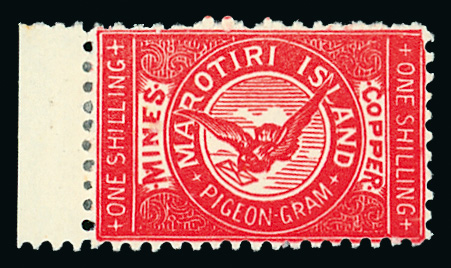
These stamps are very rare in used condition and forgeries exist (see below). These stamps seem to be described in the book 'Cinderella stamps of Australasia, first edition'. However, I haven't seen this book personally.
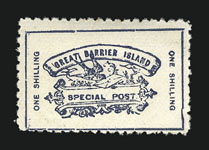
(Genuine, reduced size, image obtained from a Siegel auction)
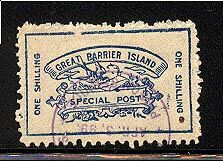
(Forgery, reduced size)
The aboved stamp is a forgery: circular date stamp Apr.3, 1899, Pigeon Service. The genuine stamp has a line before the letter "G" of "GREAT" and a dot after the word "POST". These are both missing in one of the two best known forgeries.
In "The Montreal
Philatelist" (Vol.2 No.5 November 1899, p.6; Editor Rudolph C.Bach) the following text can be found, together with an
image of what I believe concerns the above forgery:
THE GREAT BARRIER ISLAND STAMPS.
The labels so extensively advertised and sold by the Dominion
Stamp Co.,we regret to say turn out to be undoubtedly
counterfeits. A comparison between these forgeries, and the cut
used as an illustration of the stamp in the catalogues and
Philatelic Journals, reproduced herewith, reveals the fact that
the counterfeits were printed from the same electrotype. There
are many points of difference between them and the original
genuine stamp. The stock remaining has been destroyed and we have
no doubt that upon Mr. Bach's return from the Transvaal war he
will make a satisfactory settlement with all those who purchased
the stamps from him.
Note: the site
http://www.norbyhus.dk/fipliterature/biographies52.PDF states
that the Dominion Stamp Co. belonged to Mr. R. C. Bach and that
he was responsable for these Great Barrier Island forgeries. The
Dominion Stamp Co. advertises with the address 'Beaver Hall Hill,
Montreal', while Rudolph C.Bach has a different address '451
Sanguinet St. Montreal' according to advertisements in his own
journal 'The Montreal Philatelist'.

Advertisement of the Dominion Stamp Co. for the Great Barrier
Island stamps (Montreal Philatelist Vol.2 No.3, 1899, page 13)
Indeed Bach gives away Great Barrier
stamps when customers subscribe to his journal:
'Why not subscribe now. Send us 25 c silver for a years
subscription and we will send you by return mail a copy of the
rare 1 shilling Great Barrier Island Stamp, as premium'.
In 'The Montreal Philatelist'
Vol.2, no. 5, November 1899, page 5 states that the editor of
this journal Mr. R.C.Bach volunteered to be send to the Transvaal
in the Boer war. It says:
'Before leaving he made a transfer of his property viz. The
Dominion Stamp Co. and The Montreal Philatelist to Mr.
F.W.Wurtele, Mgr. giving full power to represent him in all
matters during his absence.'
This clearly proves that the Dominion Stamp Co.
was the property of Bach, despite the different addresses given
above. Mr.Wurtele sold the Dominion Stamp Co., including the
entire stock, to Mr. James Anderson almost immediatly after Bach
went to the Transvaal. Mr. Anderson renamed the business as Mount
Royal Stamp Co. (same address 6 Beaver Hall Hill
Montreal). This text was immediatly followed by the above shown
text concerning the Great Barrier Island stamps.
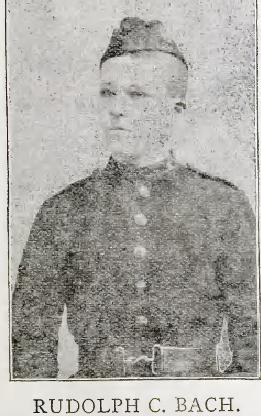
Rudolph C.Bach as pictured in his own journal 'The Montreal
Philatelist' Vol. 1, no.1 1898.
The Montreal Philatelist (Vol.2, No 7, January 1900, page 82) says: 'we have no mission to defend the actions of Mr.Bach; we know much more of his doings than anyone else, and while frankly, we say that much that he has done appears indefensible and culpable, we cannot forget, that this young man is now far away, bravely fighting the battles of his country, and even as we pen these lines he may have expiated in his heart's blood any faults he has commited.
The Philatelic Advocate
(Vol. 7, No. 6, p.43; editors Starnaman Bros. Berlin Ontario)
states:
"Great Barrier Forgery.
"Quite a sensation was caused among the philatelists of this
city when it came out that the 'Great Barrier Island Pigeon Post'
stamps(?), with which the country has been flooded, had been
printed, perforated and cancelled in this city. Although there
has always been a strong suspicion that these stamps were not
'all right' it was hardly thought that they were being
manufactured in this city.
The whole scheme was worked by the manager of the late Dominion
Stamp Co. who is now on his way to South Africa with the Canadian
Volunteers.
But this is not all, as it is said that in the same box in which
the stock of Pigeon Post stamps were found, there were several
hundred counterfeit 3 penny Canada which were evidently awaiting
the cancelling stamp." - Montreal Notes in Weekly Era."
Rudolph C.Bach was not re-admitted in his own journal in 1901..... (Montreal Philatelist Vol.3 No.6 December 1900, p.68).
The Philatelic Advocate (Vol.8
No.1 January 1900, p. 31) finally says: 'Everyone has now a
stone to sling at Bach, who had better stay to teach the
conquered Boers the beauties of our hobby'.
to continue with a little rhime on page 85:
"'A little Bach
sparrow sat up in a tree
And he was as slick as a sparrow could be.
A philatelist came by with his bow and arrow,
Said he, "I will shoot this little Bach sparrow;
His giblets will make me a nice little stew
His body will make me a little pie too"
Said the little Bach sparrow, "I shall be nabbled if I
stay,"
So he straightway enlisted and sailed away,k
For the Boers with their guns had no such terrors for him,
As counterfeit Great Barrier stamps so grim."
I believe this is also the forgery described in Album Weeds (there is only one forgery described in this book).
Another forgery of this stamp:

(Second forgery)
I've seen the above forgery in a sheetlet of four stamps (two printed upside down), with large empty spaces between the stamps.

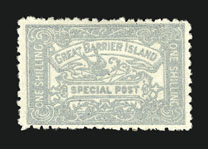
(Genuine, reduced size, image obtained from a Siegel auction)

(Genuine, reduced size, image obtained from a Siegel auction)

(the word "POST" overprinted with 'Pigeongram' and
"MAROTIRI" overprint)

(Genuine, reduced size, image obtained from a Siegel auction)

With manual overprint "Copyright".
Pigeon Mail through History by Salvador Bofarull, 184 p (I haven't read this work personally).